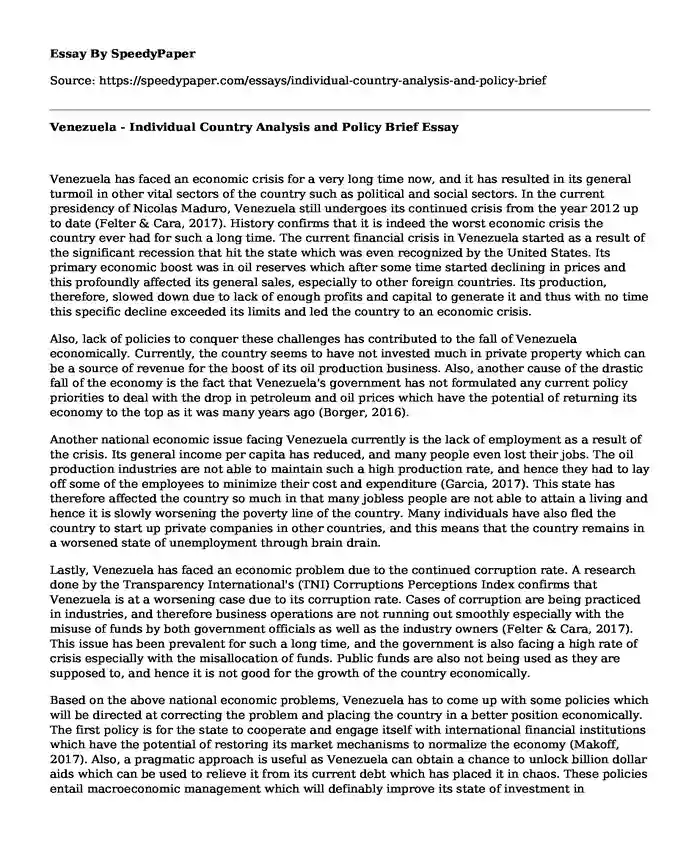Venezuela has faced an economic crisis for a very long time now, and it has resulted in its general turmoil in other vital sectors of the country such as political and social sectors. In the current presidency of Nicolas Maduro, Venezuela still undergoes its continued crisis from the year 2012 up to date (Felter & Cara, 2017). History confirms that it is indeed the worst economic crisis the country ever had for such a long time. The current financial crisis in Venezuela started as a result of the significant recession that hit the state which was even recognized by the United States. Its primary economic boost was in oil reserves which after some time started declining in prices and this profoundly affected its general sales, especially to other foreign countries. Its production, therefore, slowed down due to lack of enough profits and capital to generate it and thus with no time this specific decline exceeded its limits and led the country to an economic crisis.
Also, lack of policies to conquer these challenges has contributed to the fall of Venezuela economically. Currently, the country seems to have not invested much in private property which can be a source of revenue for the boost of its oil production business. Also, another cause of the drastic fall of the economy is the fact that Venezuela's government has not formulated any current policy priorities to deal with the drop in petroleum and oil prices which have the potential of returning its economy to the top as it was many years ago (Borger, 2016).
Another national economic issue facing Venezuela currently is the lack of employment as a result of the crisis. Its general income per capita has reduced, and many people even lost their jobs. The oil production industries are not able to maintain such a high production rate, and hence they had to lay off some of the employees to minimize their cost and expenditure (Garcia, 2017). This state has therefore affected the country so much in that many jobless people are not able to attain a living and hence it is slowly worsening the poverty line of the country. Many individuals have also fled the country to start up private companies in other countries, and this means that the country remains in a worsened state of unemployment through brain drain.
Lastly, Venezuela has faced an economic problem due to the continued corruption rate. A research done by the Transparency International's (TNI) Corruptions Perceptions Index confirms that Venezuela is at a worsening case due to its corruption rate. Cases of corruption are being practiced in industries, and therefore business operations are not running out smoothly especially with the misuse of funds by both government officials as well as the industry owners (Felter & Cara, 2017). This issue has been prevalent for such a long time, and the government is also facing a high rate of crisis especially with the misallocation of funds. Public funds are also not being used as they are supposed to, and hence it is not good for the growth of the country economically.
Based on the above national economic problems, Venezuela has to come up with some policies which will be directed at correcting the problem and placing the country in a better position economically. The first policy is for the state to cooperate and engage itself with international financial institutions which have the potential of restoring its market mechanisms to normalize the economy (Makoff, 2017). Also, a pragmatic approach is useful as Venezuela can obtain a chance to unlock billion dollar aids which can be used to relieve it from its current debt which has placed it in chaos. These policies entail macroeconomic management which will definably improve its state of investment in infrastructure and create better employment opportunities for the country's population.
Other macroeconomic policies include economic diversification where Venezuela should introduce its business to foreign countries and even participate in international direct investment business so that it may earn a better level of revenue. Also, it should seek the support of its market mechanisms so that all citizens may be encouraged to save their little earnings and reduce their dependence on foreign capital (Veron, 2017). Also, the country should seek financial assistance from the international community so that it may correct and solve its humanitarian needs which can support their re-orientation of its economy.
In conclusion, Venezuela as a country has been through a lot of economic crisis which has led to so many problems such as unemployment, low revenues, reduced oil reduction and little private investment. Hence, the country should adopt policies such as seeking financial help from the international community, increasing foreign investment and restoring its market mechanisms so that it may solve these problems and restore its economy back in line.
References
Borger, J. (2016). "Venezuela's worsening Economic Crisis- The Guardian Briefing." The Guardian.
Felter, C. & Cara, R. (2017). "Venezuela in Crisis." Council Foreign Relations.
Garcia, H. U. (2017). "Inside Venezuela's Economic Collapse." The Conversation.
Makoff, G. (2017). "Venezuela's Economic Crisis can be stopped. Here is How." World Economic Reform.
Veron, C. (2017). "Can Venezuela Resurrect its Economy?" Council Foreign Relations.
Cite this page
Venezuela - Individual Country Analysis and Policy Brief. (2022, May 20). Retrieved from https://speedypaper.com/essays/individual-country-analysis-and-policy-brief
Request Removal
If you are the original author of this essay and no longer wish to have it published on the SpeedyPaper website, please click below to request its removal:
- Free Essay Sample on Propositional Debate
- Free Essay with Criminal Psychology Research on Recidivism
- Indian Colonization, Free-to-Use Essay Sample in History
- The Bhagavad Gita Essay Example for Your Inspiration
- Emotional Communication Essay Example
- Cracking the Monolith: Challenges of Product Dev. Models to Business Ops Mgmt
- How to Speed Path to Partner. Free Essay
Popular categories





